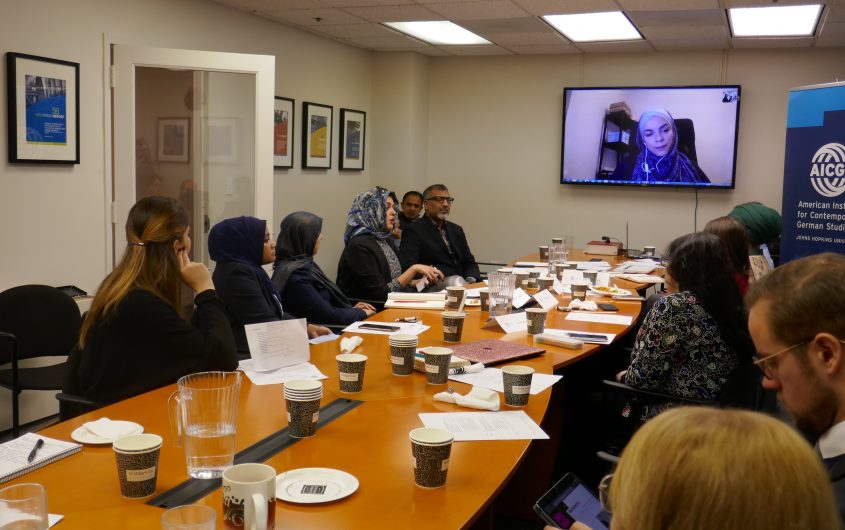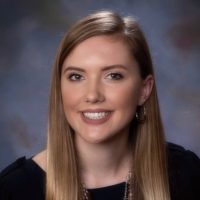
Muslim Women in Germany and the United States

Isabella Mekker
Research Intern
Isabella Mekker was a research intern at AICGS for the spring of 2019. She writes articles for the AICGS website, conducts research for current projects and resident fellows, manages databases, operates the front desk, and helps to organize and document events.
Ms. Mekker is currently pursuing a Master’s degree in International Affairs at George Washington University’s Elliott School of International Affairs, with a focus on International Security and Global Gender Policy. Her current research interests focus on security and development policy, the European Union, and the role of China in the future of international affairs.
Prior to pursuing her Master’s degree, Isabella received a Bachelor’s degree in Political Science from Clark University. Isabella has spent time living in Beijing, China, where she was a student for four years and an intern at a healthcare nonprofit for several months. She has also lived and studied German in both Vienna and Munich.
Common and Complex Challenges
Bringing together an interdisciplinary group of practitioners and experts from Germany and the United States, this workshop held on February 20, 2019, focused on the economic situation of Muslim women, the role of women in Muslim organizations, and the involvement of Muslim women in new media, technology, and the Internet. The reality that there are few studies or data on Muslim women in Germany and the United States points to a neglect of this minority group and of their important and growing role in society. This workshop aimed to fill the lacunae in comparative knowledge about Muslim women and their integration and influence in German and American societies through transatlantic dialogue and networking.
Panel 1: The Economic Situation of Muslim Women
The conference began with a panel discussion on the economic challenges that Muslim women face on both sides of the transatlantic relationship, as well as the measures that could be taken to counteract these challenges. The questions discussed included how these economic challenges impact social and cultural integration for Muslim women. The two speakers, Dilek Topkara and Rama Issa-Ibrahim, spoke about their own economic challenges, how they have been able to deal with them, as well as how they have seen these challenges impact their respective communities.
- Dilek Topkara is an entrepreneur and owner of her own bakery in Berlin. She created her business from scratch with no money and is now teaching other women in her position how to do the same. Through starting her own bakery, she was able to create a space where she could work for herself and rebuild her identity.
- Topkara recounted her experiences with identity crises and racism growing up in her community, and how that pushed her to work even harder to accomplish her goals. Having said that, she noted that not everyone is able to overcome economic challenges and identity issues in the way that she did. While her experiences made her more resilient, many women end up working jobs they are underqualified for because of restrictions. Overall, one of the ways she has been able to overcome her obstacles is through educational opportunities and training abroad.
- Rama Issa-Ibrahim works with the Arab American Association of New York, which is an organization that advocates for the voice of the robust Arab population in New York City. She indicated that the mission of her work has shifted over the years in response to the various needs of the Arab population in New York. Now, she largely focuses on empowering women and fighting for their inclusion. Education, according to Issa-Ibrahim, is key to fostering integration and inclusion in society.
- Issa-Ibrahim noted that in her experience, women often have not had access to education due to cultural limitations. In order to combat this, the association has created programs to empower women to realize their agency in making change happen. The programs initially began with ESL classes, as learning English was often the primary barrier prohibiting women from being able to participate in the economy. Now, the association has branched off to a variety of other outreach programs including working on elections. She noted that some of the most impactful measures in changing the economic situation of women will result from listening to their specific needs.
Panel 2: The Role of Women in Muslim Organizations
The second panel of the day discussed the similarities and differences between Muslim organizations in Germany and the United States. Furthermore, the discussion took these conclusions and asked the question of how women in the next generations can be integrated as leaders of these organizations, as well as how these organizations could improve their interactions with governments. Dalia Mogahed and Pinar Iskender Cetin both remarked on their experiences being leaders of organizations in the United States and Germany, and how this can enlighten a future of cooperation and inclusion.
- Mogahed works for the Institute for Social Policy and Understanding and provided insight into the common issues that American Muslim women face in organizations. She noted that while most other religious groups tend to situate around one socioeconomic stratum, American Muslim women are extremely diverse socioeconomically. They also tend to be more educated than American Muslim men and have some of the highest education rates of women in America. Nevertheless, American Muslim women are often the primary targets of Islamophobia, so despite high levels of education they tend to struggle with regard to leadership roles in organizations.
- Dalia Mogahed noted that when American Muslim women are in high leadership positions, it is often the result of either a woman having founded the organization, or it being an organization with high governance structures and a merit-based system for climbing the ladder. She also mentioned that Muslim women are often perceived as being oppressed and in need of saving, which takes away from their agency as working professionals pursuing careers. Lastly, Ms. Mogahed drew the conclusion that in order to combat these problems, it is important that groups support one another and are as inclusive as possible in the struggle for increasing participation of American Muslim women in organizations.
- Cetin is the founder of the Deutsche Islam Akademie (German Islam Academy) in Berlin. She contended that her experiences in founding this organization reflect the increase of inclusion of German Muslim women in organizations across the country. Ms. Cetin built on Ms. Mogahed’s remarks that Muslim women are portrayed as being oppressed and incapable of leading organizations and businesses, and that the racism, sexism, xenophobia, and Islamophobia that German Muslim women face have made it difficult for their high profiles to be noticed.
- Pinar Cetin concluded that after three generations, children of migrants still feel ostracized from society in Germany. With that being said, this has been transforming throughout every generation, and slowly people are beginning to feel more a part of German culture and society. There are growing numbers of successful German Muslim women across political, academic, and economic organizations. Ms. Cetin notes that one of the primary issues has been creating a cohesive voice for Muslim women in Germany, as often organizational differences have made it difficult for Muslim organizations to be formally recognized by the German government.
Panel 3: The Consequences of Social Media and the Internet
The last panel focused on an area of modern contention: the role of social media in society. Specifically, the speakers addressed the positive and negative aspects of social media, and how this form of technology can be used to shape perceptions of Muslim women in society. Additionally, tying back to past discussions, the question of whether social media could be used to create a new generation of women in leadership positions was brought to light. Amani Al-Khatahtbeh and Soufeina Hamed spoke to all of these topics, reflecting on their personal experiences with social media.
- Al-Khatahtbeh founded MuslimGirl.com when she was still in high school, and as such has grappled with the world of social media from a young age. Having watched her page’s influence grow, she noted that over time her website became a space where Muslim women could decide who they were without society deciding for them. She argued that her website not only became a space for Muslim women to contribute to society, but also a platform for women to influence policy that impacts Muslim women.
- Even since starting MuslimGirl.com, Amani Al-Khatahtbeh remarked that she has dealt with a significant amount of hate and discrimination. These criticisms, she argued, come from the notion that many people in society are not used to the idea of a liberal Muslim woman, and this perception happens even within feminist movements. She said, “when you don’t look, sound, or act like they think a Muslim woman should,” people feel their perceptions are threatened. Social media has been able to connect Muslim women despite geographical boundaries, creating a sense of solidarity and common identity.
- Soufeina Hamed writes and illustrates comics in Berlin, reflecting on her own identity issues and the struggles of German Muslim women. Her goal in using this alternative form of artistic medium is to get away from the singular discussion of the “hijab,” as this is what people are consistently thinking of with regard to Muslim women’s issues. She noted that “for some reason, being ‘Muslim’ and doing comics don’t go together for many people,” and so her art has sparked controversy for Muslim and non-Muslim communities alike. However, she has been able to begin a dialogue regarding her struggles through this artistic medium, reaching audiences that understand and empathize with her experiences and who otherwise may not have seen her work.
- Hamed brought up her experiences with audiences abroad, and how Muslim women in other countries such as Algeria and Malaysia see her work differently than that of many Germans. Being a Muslim woman has always been such a big part of her identity, and in places such as Malaysia and Algeria she noted that it was such an inherent part of their everyday lives they had not thought of it as being something controversial. Her experiences became a gateway for not only fostering greater understanding in Germany but also transnationally. To conclude, Soufeina suggested that each generation is likely to use new forms of media to express their experiences and influence perceptions on a wider-scale.








